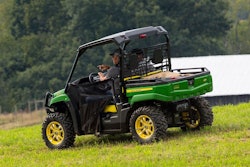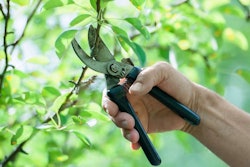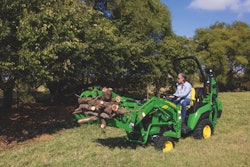 Boxwood blight arrived in the U.S. in 2011 and has been spreading since then.
Boxwood blight arrived in the U.S. in 2011 and has been spreading since then.Photo: Richard Buckley, Rutgets PDL
Pennsylvania has issued a quarantine order to prevent the spread of boxwood blight.
The disease, which is known for causing sudden leaf loss and sometimes death in the common landscaping plant, is caused by the fungus Cylindrocladium buxicola, also called Cylindrocladium pseudonaviculatum and Calonectria pseudonaviculata.
Boxwood is not the only plant that is affected; all plants of the genus Buxus are vulnerable to the blight.
The quarantine restricts the movement of any material or object that may carry or spread the fungus, including both inter- and intrastate movement.
Shippers from other states are subject to inspection and must meet the commonwealth’s standards before their plant material is allowed to enter Pennsylvania for resale distribution.
For the first violation of the quarantine, all plants will be destroyed, the area where the plants were found will be sanitized, and the supplier of the plants will be forbidden from sending plants of the Buxus genus until certain provisions are met.
If there is a second violation, all Buxus species at that location will be placed under a “Stop Sale” order and a sample of plants will be observed for 30 days to see whether boxwood blight develops.
The facility will have to inform the Pennsylvania Department of Agriculture about all shipments of the Buxus species.
On a third violation of the quarantine, the supplier will be suspended from sending any plants of the Buxus species anywhere within the state. Violators may also face criminal prosecution carrying the possibility of 90 days in jail and a fine up to $300 for each violation. They may also receive a civil penalty of up to $20,000 with respect to each violation.
Boxwood blight was found in Pennsylvania in 2012 and the state Department of Agriculture has been working to destroy all plants found to have the disease.
“In our increasingly global world, biosecurity is an increasing concern in order to safeguard our citizens, animals, and plants, and this quarantine implements important cautions,” said Agriculture Secretary Russell Redding in a statement. “This summer’s heat and humidity provides perfect conditions for the spread of boxwood blight, so we’re working in partnership with the green industry and homeowners to prevent the establishment of this dangerous fungus.”
Symptoms can be spotted in rapid defoliation, black cankers, leaf spots and severe dieback. While boxwood blight doesn’t always kill the plant, it weakens the plant to other diseases that are fatal.
The fungus’ spores are able to cling to anything exposed to an infected plant and can live on for at least five years on dead leaves.
Burn or bury infected plants and clean pruning tools after working with each bush.
Those who believe they have boxwood blight should contact the Penn State Extension office.










